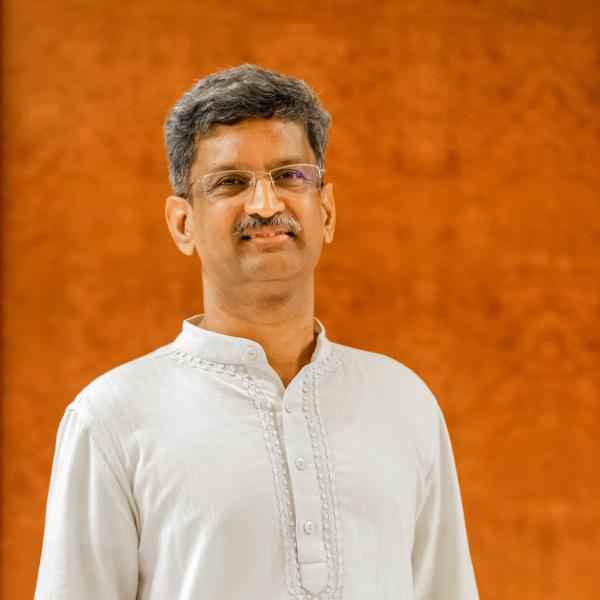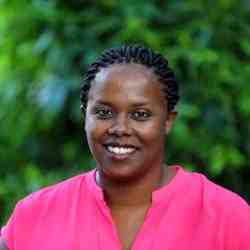Introduction
Raghunathan shifts the approach to supporting small farmers from technical solutions that focus on production targets, to an approach that focuses on maximizing farmers’ net income - involving other small farmers from the community in this process and coming up with value added products and services for their fellow farmers and, ultimately, the higher value produce destined for the broader market. The goal of this systemic approach is to build more interdependent and resilient communities, confident and capable of entrepreneuring their own new solutions. His approach already reaches around 1 million of the 126 million small farmers in India, and its impact is on a rapid upward growth curve.
The New Idea
Raghunathan (Raghu) has devised an approach to improve the self-sufficiency of India’s large farmer base, by shifting the self-belief and role of a farmer into someone who is an entrepreneur. By enabling individual or small groups of farmers to focus on specialization of a product or service at a localized level, Raghu is building the accountability and interdependence that each new ‘entrepreneur’ has to the larger farming community, in relation to quality of advice or services. An example of this is the focus on reducing input costs through having one farmer specialize in producing high quality bio-pesticides, which recycles the internal capital of the region and thus freeing up other farmers from purchasing chemical pesticides and fertilizers. Raghu is mobilizing the Indian farmer communities to promote efficiency, livelihood generation and collective success.
Raghu realized early on that in order to make such a model successful, an integrated system of support needed to be made available to these new ‘entrepreneurs.’ He plugged into the various functionaries that entrepreneurs and farmers needed in order to strive, such as access to loan products to meet their working capital needs. Raghu partnered with influential institutions such as NABARD (National Bank for Agriculture and Rural Development) to come up with a loan product designed specifically for this purpose. As a result of plugging in to the larger system, creating market linkages, making widely accessible new products and so forth, Raghu has created an ecosystem that allows farming communities to function in a manner where there can be specialization and collective growth.
Raghunathan was able to demonstrate the value and impact of this tested model across farming communities and subsequently scale the approach across different agro-ecological zones, from Madhya Pradesh to Chhattisgarh. His scaled interventions which have reached the majority of states in India, have touched upon different types of farming communities, from those focused on diversified dairy to marine fisherfolk who work across multiple coastal states. In doing so, Raghu has been able to build a cohesive model that converts farmers, traders, and other stakeholders in these communities to becoming changemakers, whom through new enterprises create new and additional value. This interconnected model has facilitated the creation of stronger market value for the produce of farmers and ultimately economic value of the communities in the farming regions.
Having had his model independently validated by influential institutions such as NABARD, state governments and large philanthropists, Raghu decided to create an online platform that could connect the growing communities who were organizing into this new system to share their learnings with each other and derive even further value. Partnering with Mindtree and Social Venture Partners, Raghu built this end-end platform that connects farmers, major buyers (such as Big Basket – India’s largest online supermarket), services and providers (such as creditors, training modules, market information and market linkages), which has enabled farmer groups/organizations to access a larger range of services. The platform has also managed to allow transparency in pricing and options for all stakeholders.
Called, PIE or the Platform for Inclusive Entrepreneurship (PIE), this producer centric digital platform is built on the principles of ‘Societal Platform’ or being kept an open-source infrastructure that can be actively built upon to serve the needs of stakeholders. The platform serves the purpose of transforming the journey of a farmer, right suggestions for specialization in work, connecting them to services in a timely manner and finally handholding them as a support network to turn their challenges into opportunities. Raghu’s mission is to meet the new Digital India in the middle, ensuring all farmers, service providers and stakeholders can benefit from being part of the same platform.
The Problem
Small and marginal farmers (with less than two hectares of land) number 126 million people and account for 86.2% of all farmers in India but own just 47.3% of the crop area, according to the 10th Agriculture Census in 2015-16. These 126 million farmers together owned about 74.4 million hectares of land —or an average holding of just 0.6 hectares each—not enough to produce surpluses which can financially sustain their families, explaining the rising distress in the Indian agriculture sector.
The ecological challenges that India is faced with further compounds the pressure put on farmers, with a prediction that within 9 years, all of India’s water reserves will run out. Being a country once defined and recognized by its farmers, India is today seeing a generational shift in preferences with many youths choosing to migrate into major cities to look for alternative occupations. The resulting future is one which presents even more complex problems for the country, including food security.
Smallholder agriculture in the current form, i.e., business as usual, does not work and it is economically unviable. Factors that limit and impact livelihoods of smallholder farmers are virtually unlimited in number and variety. Perhaps the most pressing of these barriers that prevents economic prosperity of the farmers is the fact that access to inputs and additional services still remains widely unavailable. Where there is opportunity, usually the choices are limited and expensive or the farmers themselves do not know how to develop the necessary skills and processes to diversify. Entry into new commodities is fraught with production risk, market risk and accessibility/cost of capital denial. The climatic vagaries and market fluctuations increase the vulnerability of farmers, who are then further alienated from a growth mindset and any opportunity that may arise in the future. Poverty and smallholder farming is today a synonymous identity.
While the challenges are many, solutions to most of these systemic barriers do exist but they exist in vaults. Agricultural innovations are with scientific institutions and the government. Finance is with the banks and the limited who are seen as worthy of being bankable. Support schemes are with the government, never reaching those they need to. NGOs limit their work only to mobilize, whereas there is a need to engage with markets and move up in the value chain for the farmers. Markets operate with their own efficiency and farmers have to themselves find ways to engage with that. For the facilitators and supporters, the metrics are not incentivized to look at change in farmers (metrics are largely services that people handle). Most times these services are in a form that is inaccessible to smallholder farmers. The fragmented ecosystem is limiting the scale and sustenance of the support to smallholder farmers to make these solutions work for them.
Raghunathan realizes the potential of agriculture as a sector in creating and sustaining millions of jobs in India, and smallholder farmers as key constituency and contributor cannot be ignored. About 100 million smallholder farmers employ themselves on their farms and provide employment to their own family members and others. Therefore, every rupee invested, and done so effectively towards smallholder agriculture and farmers has huge potential to not only make their enterprises thrive but can potentially reduce poverty substantially.
At the same time, there are also plenty of opportunities given this sector is a major focus point for the government in India. The government’s focus on farmers’ welfare, food production and producer’s aggregation, corporate supply chains focus on sustainability, and development investments from Corporate Social Responsibility (CSR), are some of the big opportunities present. The increasing consumer demand for food products, ready-made processed food, etc. are also great market pulls, further exacerbated by a burgeoning middle class. It is important to bring these levers together to empower farmers to leverage these opportunities to build up their collective wealth and wellbeing.
The Strategy
In 1994, Catalyst Management Services (CMS) was started by Raghunathan and his co-founder, Shiv. CMS started as a consulting organization to bring professional management support to development organizations and was involved in various projects like mapping ROI on a village development project, mapping channels of the traditional fish sector in the Bay of Bengal, and consulting with the Department of International Development. Over the years, CMS then established their own social labs – Swasthi and Vrutti, and also supported a number of other organizations, GREEN Foundation and FishMARC are a part of their group of institutions. Apart from the social labs that were set up by CMS, Raghunathan also built on his strengths and worked towards understanding the dynamics of the unorganized milk sector, working with women fish vendors, scaling women owned businesses in partnership with Walmart, providing entrepreneurial support, enterprise support and environmental support.
In 2002, Swasthi was set up as a health resource center to work with sex workers and transgendered communities. They began their work with supporting Targeted Intervention (TI) to control HIV in India, working with high-risk groups such as Female Sex Workers. Leading from this work, Swathi Jyothi, a cooperative by sex workers, was born where the sex workers created their own products (like savings on the field and emergency withdrawals) and had their own governance and management structure. Raghunathan, through evidence from this work, found that by improving their financial security, social protection, and ability to engage as an institution reduced their vulnerability and risk to HIV significantly. Following from this work with the sex workers community, Raghu realized the importance of such integrated services to better the livelihoods of farmers and launched the organization Vrutti.
Vrutti was registered as an entity in 2004, focusing on livelihood impact models, it was started by Raghunathan to build on his strengths and passion for people’s livelihoods. Vrutti and Swasti are not-for-profit organizations registered under the Karnataka State Societies Registration Act, 1960, which function independent of CMS with different Board of Directors. Raghunathan is now the Chief Mentor and the chief guiding officer at Vrutti which allows him to work on the vision and mission of the organization, to create larger partnerships and build ecosystems - instead of the day-to-day administrative duties.
Vrutti’s work began with an impact assessment of agricultural intervention plans in the tribal areas of Madhya Pradesh. By 2009, the first Agriculture Enterprise Facilitation Centre was set up in MP and the 1st pilot was conducted with 250 farmers. This pilot project led to self-organization and collaboration among the farmer group in different ways like producing their own bio-pesticides or moving into first stage processing, for example pulping of tomatoes into paste, leading to higher and steady income for these farmer groups. Subsequent scaling steps led to an investment by NABARD under their Rural Innovation Fund. This partnership to scale the farmer/entrepreneur program across the country with 5 state governments helped them figure out how to scale to larger farmer organizations, and to sharpen their selection criteria and range of services. This work further evolved into the ‘3Fold idea and model’ to integrate services like farm advisory and planning, input services, seeds, fertilizers, financing, and farm evaluation.
By 2014-15, the 3-fold model was being tested and scaled up by Raghunathan’s organization and team, in partnership with Mindtree, Social Venture Partners and Industree. It is currently operational in seven clusters across five states in India. In 2017, Raghunathan received support from Nandan Nilekani’s team to integrate the artisanal and informal industry on his platform through Industree. An important aspect of this Platform for Inclusive Entrepreneurship (PIE) is creating families as enterprising units by bridging access to knowledge, capital, and the integration of farming and non-farming/artisanal options by helping them create a business plan. Additionally, support in building market to meet the demands with supply through market linkages and reducing middlemen to increase profitability is also facilitated.
The Four key elements of this model are activators/integrators, partnerships, technology -I Got Crops, and business model at cluster levels. I Got Crops (IGC) is a digital platform, built in collaboration with Mindtree as part of their CSR, for the onboarding of farmers, farmer learning groups, input services and currently adding B2B and B2C services. IGC enhances the entire agriculture value chain for a farmer – from crop selection to distribution and sales. Through the platform, farmers can get access to information in choosing the right crops, demand forecast, access to cheaper seeds, insights into how to plan crop cultivation, cheaper fertilizers and pesticides, access to best practices, access to fair and remunerative markets with no middlemen and greater profits. PIE is constantly evolving and expanding its assets, partnerships, and producers, with stakeholders from Government, private sector and civil society contributing to the platform ensuring collective impact.
By working with families as enterprises, Raghunathan also works with women owned businesses and towards women empowerment in the agriculture index. In the Indian agriculture context, 60-70% of the work is being done by women while the land is not owned by these women. With 1/3 of the members of the producer organizations being women, Raghunathan is working with women groups, enabling them with capacity building, economic benefits, ability to deal with the value chain, decision making in sales, and bringing them to the front.
Raghunathan aims to increase the participation of women, build resilience in the community by creating self- sustainable groups in form of corporative & self-help groups, increase family income, and scale women owned businesses by providing entrepreneurial support, enterprise support, and environmental support. His work with farmers and families goes beyond just poverty reduction, he works towards building resilience and self-sufficiency and has scaled across the country. Working with farmers and families to create institutions and making them sustainable by integrating technology to bring the formal and informal sector stakeholders to the micro, small and medium enterprises/farmers. He envisions to bridge the gaps in the system by working with various state governments and rural livelihood missions to implement government schemes and build self-supporting communities across India.
Through the 3Fold Model and Vrutti’s work with FPOs, they have reached over 130,000 small and marginal farmers and landless laborers in seven states, about 50,000 micro-small-medium entrepreneurs/women-owned businesses, over 200,000 women factory workers in over 240 factories and 21 brands, key populations (130,000 female sex workers, transgendered, men who have sex with men), disaster affected (over 70,000), ultra-poor, unorganized salt workers, and artisanal fisherfolk (over 40,000); and over 500 community organizations and non-profit/social enterprises that engage with these communities.
So far, PIE has directly impacted 22,500 small producers, accessing services through the platform, experiencing increase in net income by 3-10 times. The model is set to reach millions of small producer farmers across India through partnerships with government, civil society, market players (like big basket), and donors and academia to continue the support initiative and train people.
The Person
Raghunathan, born in the district of Pudukkottai in Tamil Nadu, has been inspired by his father and grandmother who always opened their doors to anyone in need. Having a house on the main road and close to the ‘weekly market,’ Raghunathan’s family opened their doors to the many people who visited these markets and needed a place to sleep or simply a shelter to eat food and drink water. Being a brahmin family, many people questioned the family about their open doors and to this Raghunathan’s grandmother told them - “Just see your own fingers... not all of them are at same height or width. All fingers need to be there and operate together to get any work done. People are also like that... everybody is different and unique, and we all can be together to get things done. All are equal and have their potential.” She has been a key early influence in Raghunathan’s life and has led to very powerful thinking and action to show how important it is to ensure dignity of the people you engage with and support.
His father, a post graduate working as a scientist in a central government office in Karaikudi was another key influencer throughout, simply through his actions. Raghunathan grew up witnessing his father applying his superior mastery of the English language, access to networks and understanding of government systems/procedures to constantly help those around him. In fact, growing up, Raghunathan’s father was seen as the ‘go to person’ for support in the community. It is not surprise that the deepest early influences in Raghunathan’s life, in the form of his grandmother and father would leave the longest lasting impression.
From his own experience of growing up in one of the most backward dryland farm districts, at the age of 13 Raghunathan involved himself in the local Dalit movement to fight for their human rights. This was a remarkable action by a youth who hailed from a ‘Tam-Bram’ (Tamil Brahmin) family, as he was a representative of the highest caste, and this was normatively looked down upon. By 10th grade, he had experienced by association the deep-seated social barriers and everyday exploitation that Dalits faced.
In 1989, Tamil Nadu was one of the first Indian states to increase the caste reservation to 69% for the OBC (Other Backward Castes), MBC (Most Backward Castes), and ST (Scheduled Tribes). The MBC, whom Raghunathan grew up associating himself was to be the enduring focus of Raghunathan’s subsequent life’s work. Raghunathan saw this affirmative action as hope for a future of equity and equality for those who have historically been at the peril of caste-based discrimination.
Due the influences of growing up in a farming village himself and an ancestral dependence on agriculture, academically it was a natural choice for Raghunathan to study Agriculture, which he did in the city of Coimbatore. During his undergraduate studies, Raghunathan was part of a field stay in a village called Vilathikulam for a few months, working with the agricultural department and communities, for agricultural development, watershed management and so forth. It was during this field stay that his desire to help these communities only amplified and he was able to witness first-hand the challenges and difficulties they faced.
Raghunathan credits the Institute for Rural Management, where he completed his higher studies as being the institution that taught him most about how rural production systems, social norms, structural issues, and the power of collectives worked. He went on to secure jobs in the private sector across a number of different organizations, including Amul and Gulf Cooperation Council. While the academic institutions he went to fueled him with the inspiration and his early career experiences gave him the grit and skillset across functions (project management, revenue generation, building teams etc.), Raghu faced the limitations of being driven by impact at an organization prioritizing revenue. He thus decided to start his own journey through CMS, pivoting a dream of re-envisioning the dreams and lives of rural farmers across India.




